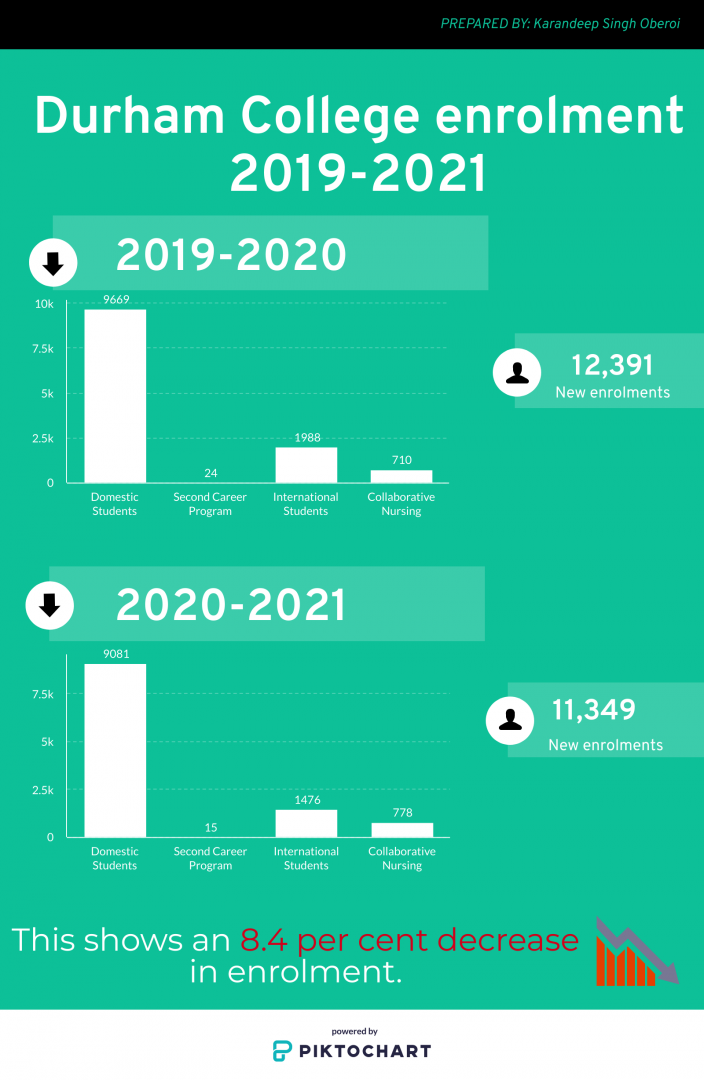Durham College (DC) has taken a financial hit due to the pandemic but remains in a solid fiscal position.
That’s the word from school administration. DC President Don Lovisa says we are living in unprecedented times.
“COVID is a challenge for everybody and there’s no rulebook, there’s no playbook for COVID,” he says, adding, “we are making decisions that are going to keep us healthy long term.”
The deficit DC has faced this year will be covered by its accumulated surplus position, says Barbara MacCheyne, DC’s vice president, administration and chief financial officer.
“Because DC had been recognizing financial surpluses over the past number of years, we build up a reserve on our books.”

These funds are accumulated surplus from the last five years that DC has been putting away for campus renovations, instructional supplies and new buildings, she says.
MacCheyne says she has indicated to the Ministry of Colleges and Universities that DC is “sitting on a $40 million surplus.”
This is not to say it’s been smooth sailing for DC. MacCheyne estimates they have incurred $6 million in extra costs due to the pandemic for procedures such as installation of plexiglass and barriers, transitioning from in-person to online delivery and upgrading the air-filtration systems.
The pandemic has also caused a decrease in enrolment. DC has gone down to 11,349 students in 2020-21, from 12,391 in 2019-20. This represents an 8.4 per cent decrease in enrolment.
But the financial picture is not positive for one of Canada’s top undergraduate universities.
Dr. Robert Haché, president of Laurentian University in Sudbury, told reporters recently that “the school was insolvent after a decade of financial strain from issues that predate the pandemic, like population decline in the region.”
Lovisa is surprised the Laurentian filed for creditor protection.
“I don’t recall in my career something like this ever occurring and I’ve been in the college system for 35 years,” he says.
Are the pressures of the pandemic a cause for financial concern for other post-secondary schools in Canada?
“It is definitely concerning to hear of a university as established as Laurentian to file for creditor protection,” says MacCheyne, adding Laurentian’s financial crisis was driven by two key factors – declining enrolment and high operating cost.
MacCheyne speculates Laurentian may have to spend more in salaries to attract faculty to move to Sudbury.
For DC, geography is not an issue. Located in the GTA, Durham has had steady enrolment every semester (pandemic numbers aside).
“Durham College is on an enrolment growth trend. So rather than declining demographics, our demographic base has been increasing,” says MacCheyne.
Laurentian offers courses in French and English. As per news reports, their classes and programs are too small to be economical. MacCheyne says, “Laurentian has a higher staff-to-student ratio, which I assume is partly a result of offering programs, both in English and French, which then raises the per student cost significantly.”
Financial statements show that last year Laurentian and Durham reported $131 million and $134 million in salaries respectively. But Laurentian had 6,834 students whereas DC had more than 12,000.
“You can see the disparity there, right?” says MacCheyne.
Lovisa says even though the pandemic poses certain financial challenges, current and future DC students have nothing to worry about.
“We have a strong cash position. We have a lot of controls in place and a lot of monitoring that takes place.
“We’re very careful about our finances.”





